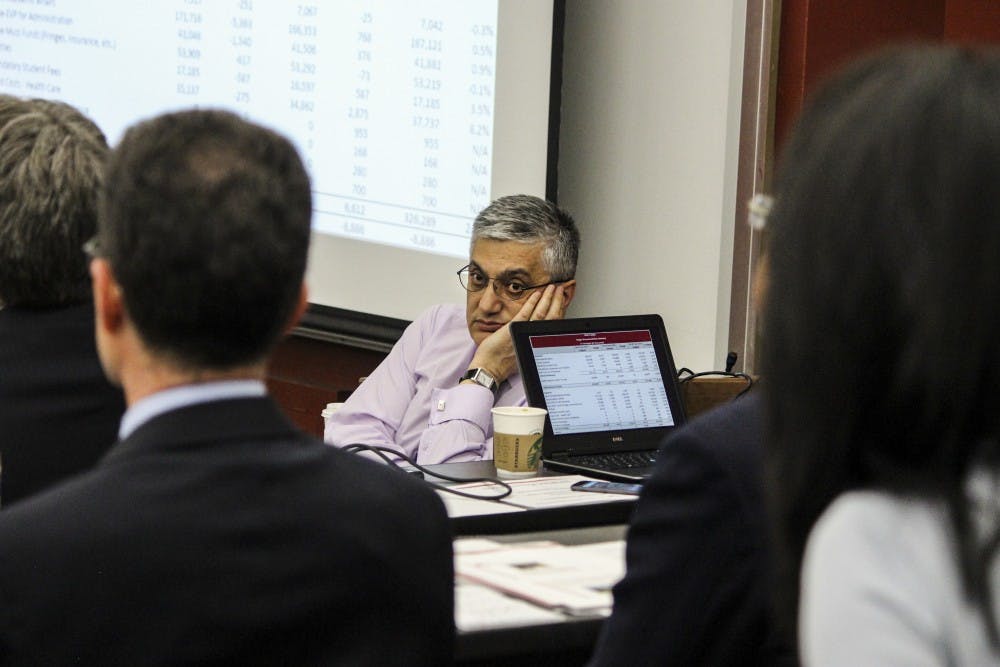During the annual budget summit Wednesday, the UNM Board of Regents approved an $18 course premium for upper division credit hours — a 7.3 percent mandatory student fee increase for undergraduate students and a five percent increase for graduate students.
The $18 premium would raise the cost of an upper division three credit course by $54.
Initially the budget leadership team proposed a $23 premium, but at the tail end of the meeting, Regent Thomas Clifford moved to modify the analysis to adjust for a lower premium rate.
The Regents settled on the $18 figure.
According to the leadership team's initial estimates, 12,000 students would not see a tuition increase next year. However, tuition for some could increase anywhere from two percent to 12 percent, depending on the number of upper division courses taken in a semester.
The team did not have the updated figures for the $18 premium available, and Regents voted on budget estimates calculated in the meeting.
Terry Babbitt, Vice President of Enrollment Management, presented the initial $23 version of the tuition proposal to the Regents and said anywhere from 500 to 700 students could expect to see a $2,500 hike in tuition.
Incoming freshmen and many other lower-level students would not be affected at all, Babbitt said.
ASUNM President Noah Brooks said the Regents’ decision to lower the increase was a win for students.
“We were the student voice yesterday, and we spoke on what the students wanted,” Brooks said. “I’d say we came out with a win.”
Brooks gave a speech at the meeting, urging Regents not to raise tuition.
“Let’s make sure that any additional financial obligations to students are brought about and timed in a way that students don’t feel overburdened,” he said during the speech.
Get content from The Daily Lobo delivered to your inbox
The proposed $23 premium would have raised the price of a three credit upper division course by $69.
“Sometimes $100 is what makes or breaks it for students at UNM,” Brooks said.
The modification lowered the University’s projected tuition revenue by approximately $1 million, leaving the administration to make up the difference.
UNM was facing an $8.8 million deficit, according to Acting Provost Craig White. Under the budget leadership proposal, the tuition increase — paired with reductions in spending — would make up a reasonable portion of that money.
However, with the eleventh hour modification, that is no longer clear.
Exact costs are being refigured by the UNM budget office after the changes and will be presented and voted on June 13, when the final budget is chalked for approval.
Clifford argued for further cuts to University costs, saying a tuition raise should come in concert with cuts.
“We would be able to articulate to our students that the (tuition) increases are being balanced by efforts on the cost side,” he said.
After Clifford expressed his views, Acting President Chaouki Abdallah cautioned the Board, saying a $1 million cut would bring consequences down the road.
“This is not a threat or a promise, I am saying we are right now stretched very much in all aspects of the academic mission,” Abdallah said. “In a year or two years or three years, some of the decisions we make will have a negative effect.”
In a post-meeting interview with the Albuquerque Journal, Abdallah said further cuts could lead to leaving vacancies unfilled, or even layoffs, the Journal reported.
The upper division course premium is referred to as differential tuition and is a policy some major research institutions have implemented to address shortfalls.
Differential tuition allows students at the highest risk of dropping out — like those in their first or second year of college — to see no increase.
“We want to maintain lower costs in the first and second year,” Babbitt said. “Keeping costs low is important at that point.”
The analysis argued that upper division courses could be classified as more valuable, stating that a higher proportion of upper division courses are taught by tenure track professors and have smaller class sizes.
The change aligns with efforts made at other universities, Babbitt said. He noted differential tuition rates are the norm, not the exception.
Brooks applauded the efforts of the budget leadership team for implementing a tuition policy that wouldn’t affect first and second year students.
“I think the way they did it was good,” he said, noting the Regents’ consideration for students was encouraging.
However, concerns over the cost to attend UNM next year are still on the table.
Deliberations in the legislative special session — which began Wednesday — on the fate of the lottery scholarship will impact many students’ cost of attendance next semester.
Contributions to the lottery scholarship from the liquor excise tax will expire if the legislature — and governor — do not pass an extension. If no extension is passed, tuition coverage from the lottery scholarship would drop 30 percent, decreasing from 90 percent to 60 percent coverage of tuition.
Brendon Gray is a news reporter for the Daily Lobo. He can be reached at news@dailylobo.com or on Twitter @notgraybrendon.






